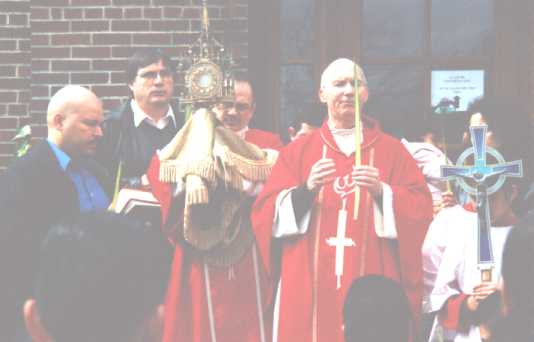Peering into the Tomb
(Homily for Easter Sunday)
If you were to ask a Christian what is the most joyful day of the year, he would very likely respond, "Easter." This is the day we celebrate Jesus' triumph over the great enemies: sin, death and Satan. We have every reason to rejoice. Nevertheless, it is important to recognize that the first Easter morning did not begin as an experience of unalloyed joy. Quite the contrary: when the disciples went to Jesus' burial place, they felt confusion and yet another reason for anxiety. The tomb was empty and they did not know why.
It is important for us to remember that today is just the beginning of a season which will last for fifty days. We have seven full weeks until Pentecost Sunday on June 4. We do not need to take in everything this morning. It is enough to go the mouth of the sepulcher, to join the disciples peering into it. As our eyes slowly adjust to the darkness, we see that the tomb is empty. Perhaps we also feel some of their confusion and anxiety.
During my years as priest (almost thirty-five now) I have been impressed by how many people come to Jesus after an experience of great desolation. It seemed to them that everything was lost and there was nothing worth living for. That was exactly how the disciples felt that first Easter morning.
The famous journalist Malcolm Muggeridge tells about a similar experience of desolation. He had achieved a certain amount of success as a media personality, was earning an enviable salary and had a good wife and family. At the same time, he experienced a mood of deep depression, partly caused by some actual difficulties. Deciding that he did not want to live any longer, he swam out to sea. He describes how he felt himself sinking as a strange sleepiness overcame him. He thought that he would take one last look at the coast. He says, "I saw the lights along the coast, and I suddenly realized that that was my home, the earth - the earth, my home, and that I must stay on the earth because I belonged there until my life had run its course. Then somehow, I don't know how, I swam back."
For Malcolm Muggeridge that "one last look at the coast" was like staring into the empty tomb. He began to ask himself the most important questions: Could the claims about Jesus really be true? Is he, in fact, God in human flesh - the key to human history? He gradually became convinced about Jesus' teaching, but could not take the step of entering the Church. In 1971 he decided to make a documentary about Mother Theresa. Malcolm Muggeridge told her he was interested in becoming a Catholic, but said that he held back because he was so disappointed by "the human elements in the Catholic Church." Mother Theresa said to him:
"You are to me like Nicodemus . . . 'unless you become a little child . . .' I am sure you will understand beautifully everything if you would only become a little child in God's hands . . . The small difficulty you have regarding the Church is finite. Overcome the finite with the infinite . . ."
It took Malcolm Muggeridge another decade, but in 1982 he and his wife Kitty entered the Catholic Church. He said that he felt not so much exhilaration as peace: "A sense of homecoming, of picking up the threads of a lost life, of responding to a bell that had long been ringing, of taking a place at a table that had long been vacant."
This Easter Morning we come from many different places. Some perhaps know the peace which Malcolm Muggeridge described. Others may feel anxiety, confusion, even a kind of despair. Wherever you are, I invite you to join the disciples in peering into the empty tomb and in asking what this means. We have the fifty days of Easter to unravel the answer.
**********
Spanish Version
From Archives (Easter homilies):
2009: Eternal Life Begins Now
2008: His Will Is Our Peace
2007: I Have Been Baptized
2006: Peering into the Tomb
2005: Transformation
2004: Ready for Combat
2003: Something To Live For
2002: The Weakest Link
2001: A New Identity
2000: Born Again!
1999: Why I Believe
Easter Vigil Homily 1998: "At the
entrance was something like a small swimming pool with three steps
leading down one side and three steps leading up the other. At the Easter
vigil they were led into the pool. The priest asked..."
The Meaning of the Resurrection: "Forgiveness is the one new thing that has entered the world. Without
forgiveness human history is bleak. Frederick Nietzsche the
philosopher who stated 'God is dead,' thought the driving force of
history is resentment..."
Other Homilies
Seapadre Homilies:
Cycle A, Cycle B, Cycle C
One of our neighboring pastors, Rev. Gary Jensen of Shorewood Lutheran has written a nice pamphlet on the Evidence for Jesus' Historical Resurrection
Bulletin (Easter in Peru, ACA parish project, Ron Belgau on same-sex "marriage," DaVinci movie, Gospel of Judas)
Announcements
Palm Sunday 2006:

Preaching Schedule (April - August)
Home

